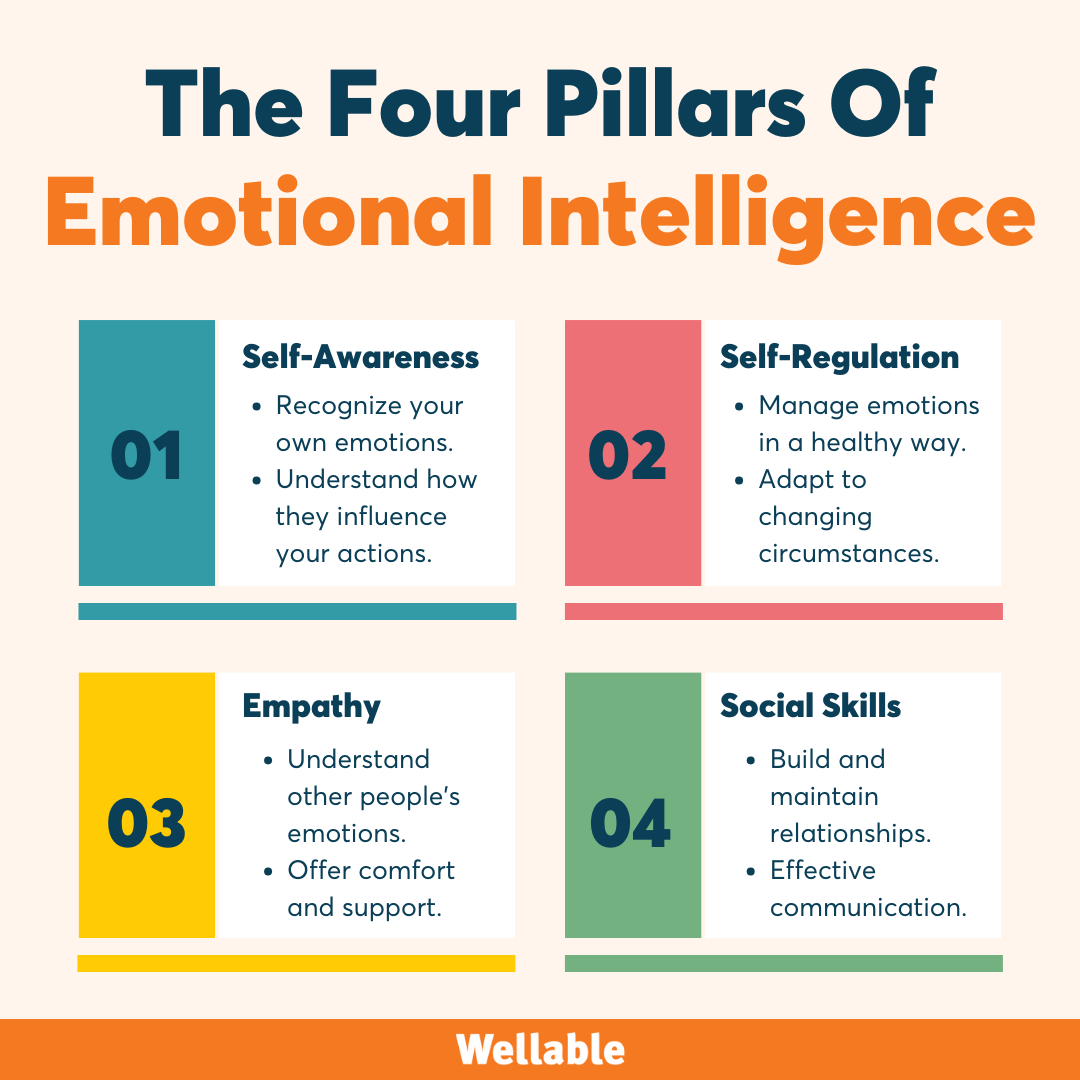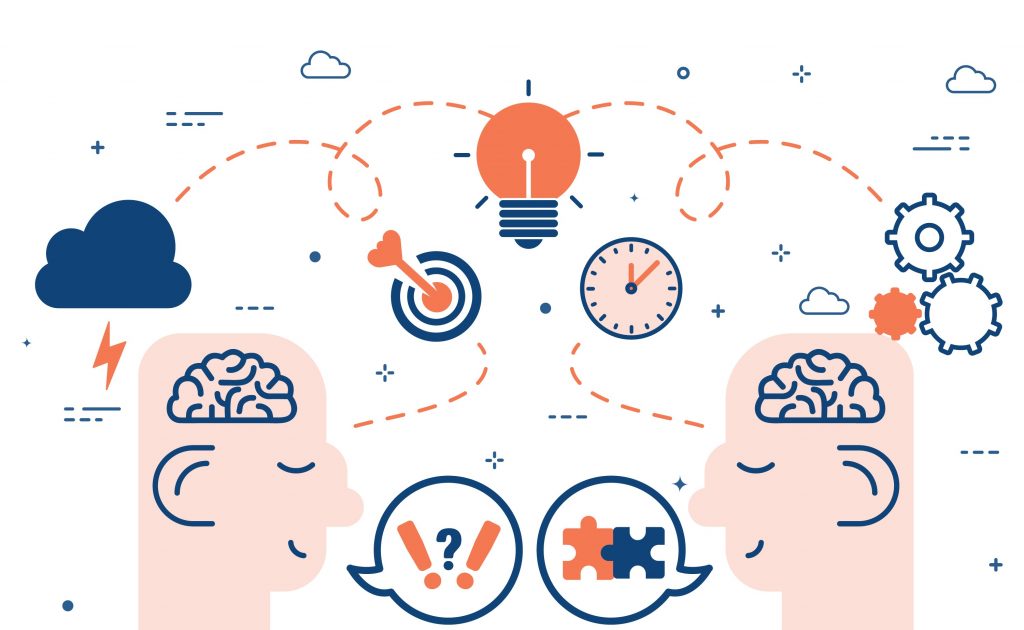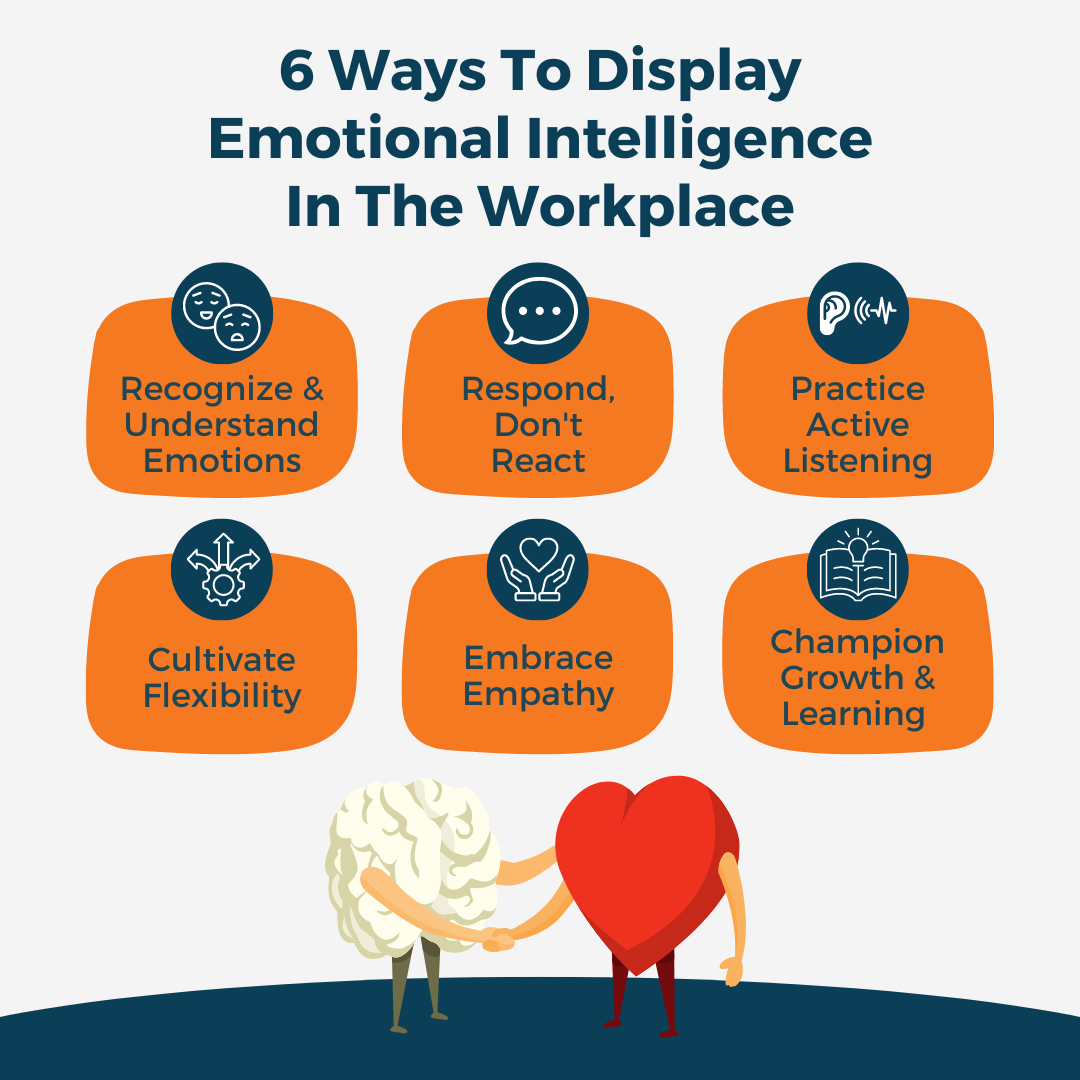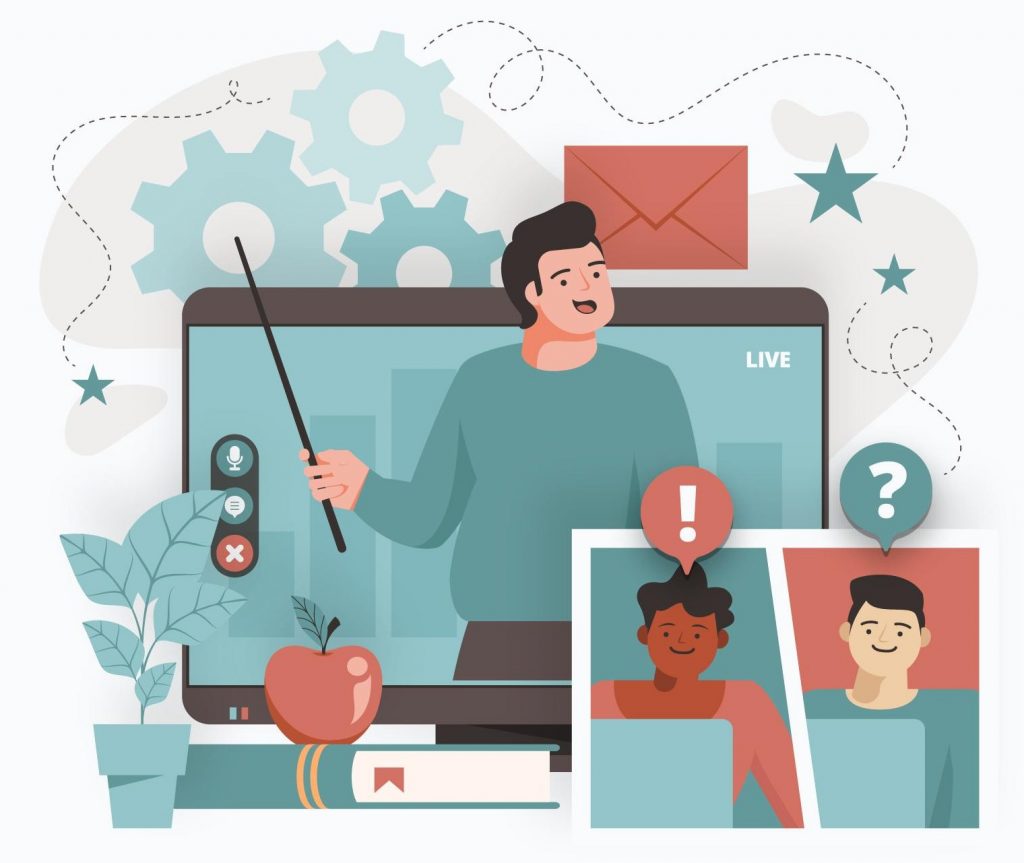Emotional intelligence in the workplace is often underestimated but emerges as a critical factor for organizational success. Beyond strategies and metrics, a company’s essence lies in its people – their emotions, interactions, and connections. Emotional intelligence for employees, which is the ability to understand and manage emotions, bridges the gap between professional tasks and team harmony.
This article covers the key components of emotional intelligence, its importance at work, personal methods to display emotional intelligence, and ways leaders can cultivate an emotionally attuned workforce.
What Is Emotional Intelligence?
Emotional intelligence in the workplace encompasses four key components: self-awareness, self-regulation, empathy, and social skills.

1. Self-Awareness
Self-awareness involves understanding one’s emotions and the way they influence decisions. Intuition, sometimes called a “gut feeling”, is connected to self-awareness. It’s those subtle hunches that often turn out to be right, guiding us to make good choices.
2. Self-Regulation
Self-regulation is the ability to manage one’s emotions and thoughts despite external circumstances. This skill allows you to stay composed and adapt to various circumstances, even when facing difficult emotions like anger or anxiety.
3. Empathy
Empathy is the ability to comprehend and connect with someone else’s situation, also known as “putting yourself in their shoes”. It includes sharing another’s feelings even if they haven’t been through the same experience while listening attentively and offering comfort. Empathy allows employees to comprehend and connect with others’ situations, providing a foundation for effective teamwork.
4. Social Skills
Social skills embody all aspects of building and maintaining healthy relationships, including teamwork, conflict resolution, communication, and problem-solving. It also involves navigating diverse social situations with skill, such as reading the room, adapting the approach based on the situation, and knowing when to step forward or take a step back.
Why Emotional Intelligence At Work Is Important
Emotional intelligence in the workplace is not just a feel-good factor; it’s a critical component for workplace success. While logic and efficiency are considered top priorities in the workplace, emotional intelligence deserves recognition as a vital component of organizational success as well. Contrary to the notion that personal connections hinder productivity, emotional intelligence enhances it by fostering healthier interactions and improved decision-making.

Enhancing Relationships & Collaboration
Personal relationships are often driven by love, shared history, or hobbies, but these factors are not sources of motivation for fostering collaboration and camaraderie in the workplace. Emotional intelligence for employees bridges this gap, providing the ability to understand and resonate with colleagues’ emotions. This, in turn, leads to a more productive and positive work environment.
Effective Conflict Resolution
Conflict is inevitable in any workplace. Emotional intelligence helps employees in managing conflicts with empathy and understanding, as well as identifying unspoken concerns. This paves the way for fair and considerate solutions that satisfy all parties involved.
Adapting To Change
The modern workplace is dynamic and constantly evolving. Employees with high emotional intelligence can easily manage stress from shifts in their roles or the company’s direction, maintaining resilience and composure.

Elevating Leadership
Leaders with emotional intelligence can inspire and motivate their teams authentically. By understanding the motivations and concerns of their team members, they can tailor their approach and communication for optimal results.
Boosting Job Satisfaction
Emotional intelligence in the workplace has been linked to job satisfaction across various industries. Individuals with high emotional intelligence experience greater emotional well-being and positivity, reducing the chances of burnout and fostering a stronger commitment to their work.
Driving Performance
Research indicates that emotional intelligence is a key predictor of job performance, accounting for 58% of success across all job types. Ninety percent of top performers exhibit high levels of emotional intelligence, underscoring its impact on decision-making, relationship-building, and stress management.
Counteracting Groupthink

Emotional intelligence empowers individuals to voice diverse perspectives, minimizing the pitfalls of groupthink. It encourages an inclusive environment where a range of ideas are considered, leading to more innovative solutions.
Nurturing Personal Growth
Individuals with high emotional intelligence are more likely to tap into their professional potential. They approach challenges with confidence, remain open to learning, and take proactive steps to enhance their skills.
How To Display Emotional Intelligence In The Workplace

Emotional intelligence is a skill to develop and apply in the workplace to enhance collaboration, communication, and effectiveness. There are various ways employees and leaders can practice emotional intelligence in the workplace.
Recognize & Understand Your Emotions
The foundation of emotional intelligence for employees is built in recognizing and understanding one’s own emotions. Begin with an inward journey, asking questions like:
- How am I feeling about my work or colleagues?
- How am I feeling about my personal life and relationships?
- How are these emotions influencing my behavior in the workplace?
- Am I allowing negative emotions to impact my performance or interactions with others?
By acknowledging your feelings, you can better control how they affect your interactions and decisions.
Respond, Don’t React
Emotionally intelligent employees resist impulsive reactions during conflicts or disagreements. Instead of immediately reacting, take a moment to understand your emotions and choose a composed approach. Responding thoughtfully fosters a more productive resolution and prevents escalating tensions.
Practice Active Listening

Enhance emotional intelligence at work by engaging in active listening. Pay attention to nonverbal cues, tone, and expressions to grasp the emotions behind the words. This practice prevents misunderstandings, shows respect, and empowers you to respond more effectively.
Cultivate Flexibility
Emotional intelligence for employees involves adaptability. Be open to shifting plans or approaches when necessary, recognizing that rigid adherence to a plan can hinder progress. Flexibility enables you to navigate change and make agile decisions.

Embrace Empathy
Understand the perspectives of others by putting yourself in their shoes. Empathy enables employees to connect emotionally leading to more authentic interactions and an improved ability to work harmoniously.
Champion Growth & Learning
Remember that strengthening emotional intelligence requires practice. Strive to continuously improve your emotional awareness, adaptability, and interpersonal skills. Learning from experiences and refining your emotional intelligence yields long-term benefits.
How To Cultivate Emotional Intelligence In The Workplace As A Leader
In addition to refining the skills mentioned above, leaders are integral in cultivating emotional intelligence across the entire organizational landscape.
Lead By Example
It’s vital for leaders to showcase emotional intelligence in the workplace through their actions and decisions. They should model the behavior they expect from their team, and create an atmosphere that values emotional well-being, empathy, and open communication.
Provide Training & Resources
Invest in employee emotional intelligence development at work. Offer emotional intelligence training and resources that enhance:
- Emotional awareness
- Effective communication and conflict resolution
- Stress management
Foster Open Communication

Create an emotionally intelligent work environment where employees feel safe sharing their feelings, opinions, and concerns. This allows leaders to address concerns and resolve issues, preventing resentment and maintaining a healthier work dynamic.
Feedback can be facilitated through one-on-one check-ins and digital platforms. Constructive feedback has the intention of helping colleagues grow, rather than criticizing or placing blame. This should always be a two-way dialogue that promotes improvement and growth.
Encourage Employee Autonomy
Empower employees to take initiative and make their own decisions when possible. Encourage them to voice their opinions and ideas, demonstrating trust in their personal emotional intelligence and capabilities.
Respect Work-Life Boundaries
Recognize that upholding personal and professional boundaries is vital. While building relationships is important, it’s essential to strike a balance that maintains a professional demeanor and prevents overstepping.
5 Initiatives & Training Resources For Emotional Intelligence At Work
Leaders should allocate resources and initiatives toward enhancing emotional intelligence in the workplace, both for themselves and their employees. This investment not only contributes to their personal growth but also fosters a more emotionally attuned and harmonious work culture.
1. Emotional Intelligence Assessment

Emotional intelligence tests offer employees insights into their competencies and opportunities for growth. It also helps managers understand their team’s strengths and weaknesses. This facilitates targeted skill development and the adjustment of management approaches to foster effective employee interactions.
2. Wellness Challenges
Effective stress management is a key component of emotional intelligence, allowing individuals to make informed decisions and maintain productive work relationships in times of stress or within high-pressure environments. A wellness initiative, such as our Stress Less challenge, can help employees develop a variety of techniques to manage and cope with stress in healthy ways.
3. Books
Several books can deepen employees’ and leaders’ understanding of emotional intelligence while learning practical techniques, such as:
- Emotional Intelligence 2.0 by Drs Travis Bradberry and Jean Greaves
- Emotional Intelligence: Why It Can Matter More Than IQ by Daniel Goleman
- Primal Leadership: Unleashing the Power of Emotional Intelligence by Daniel Goleman, Richard Boyatzis and Annie McKee
- The Emotionally Intelligent Manager: How to Develop and Use the Four Key Emotional Skills of Leadership by Peter Salovey, John Mayer and David Caruso
- Becoming a Resonant Leader: Develop Your Emotional Intelligence, Renew Your Relationships, Sustain Your Effectiveness by Annie McKee, Richard Boyatzis, and Frances Johnston, 2008
4. Webinars

Webinars offer a convenient and engaging way for employees to learn about emotional intelligence. Through interactive discussions and expert insights, participants can gain a deeper understanding of this skill’s significance and practical applications. From exploring real-world case studies to engaging in collaborative exercises, webinars provide a dynamic space to develop crucial abilities such as effective communication and conflict resolution.
5. Coaching & Mentoring
One-on-one coaching or mentoring sessions provide personalized guidance for improving employee emotional intelligence. These professionals can help employees reflect on their emotions, provide feedback, and offer strategies to manage emotions effectively in various workplace situations.












